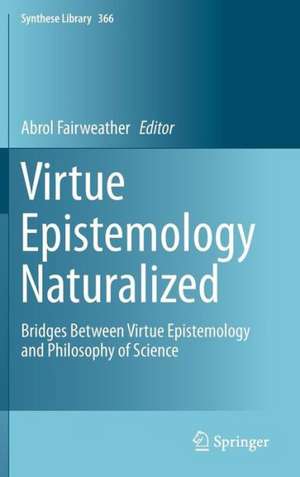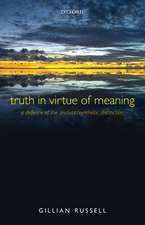Virtue Epistemology Naturalized: Bridges Between Virtue Epistemology and Philosophy of Science: Synthese Library, cartea 366
Editat de Abrol Fairweatheren Limba Engleză Hardback – 16 iun 2014
Virtue epistemology has opened many new areas of inquiry in contemporary epistemology including: epistemic agency, the role of motivations and emotions in epistemology, the nature of abilities, skills and competences, wisdom and curiosity.
Value driven epistemic inquiry has become quite complex and there is a need for a responsible and rigorous process of constructing naturalized theories of epistemic virtue. This volume makes the involvement of the sciences more explicit and looks at the empirical aspect of virtue epistemology.
Concerns about virtue epistemology are considered in the essays contained here, including the question: can any virtue epistemology meet both the normativity constraint and the empirical constraint? The volume suggests that these worries should not be seen as impediments but rather as useful constraints and desiderata to guide the construction of naturalized theories of epistemic virtue.
| Toate formatele și edițiile | Preț | Express |
|---|---|---|
| Paperback (1) | 566.52 lei 38-44 zile | |
| Springer International Publishing – 3 sep 2016 | 566.52 lei 38-44 zile | |
| Hardback (1) | 577.43 lei 38-44 zile | |
| Springer International Publishing – 16 iun 2014 | 577.43 lei 38-44 zile |
Din seria Synthese Library
- 15%
 Preț: 638.43 lei
Preț: 638.43 lei - 18%
 Preț: 989.98 lei
Preț: 989.98 lei - 15%
 Preț: 596.69 lei
Preț: 596.69 lei - 18%
 Preț: 903.93 lei
Preț: 903.93 lei - 15%
 Preț: 586.88 lei
Preț: 586.88 lei - 15%
 Preț: 696.50 lei
Preț: 696.50 lei - 18%
 Preț: 892.90 lei
Preț: 892.90 lei - 15%
 Preț: 643.34 lei
Preț: 643.34 lei -
 Preț: 282.33 lei
Preț: 282.33 lei - 5%
 Preț: 372.19 lei
Preț: 372.19 lei -
 Preț: 443.10 lei
Preț: 443.10 lei - 15%
 Preț: 637.59 lei
Preț: 637.59 lei - 18%
 Preț: 958.88 lei
Preț: 958.88 lei - 15%
 Preț: 642.36 lei
Preț: 642.36 lei - 18%
 Preț: 1230.66 lei
Preț: 1230.66 lei - 15%
 Preț: 642.83 lei
Preț: 642.83 lei - 18%
 Preț: 1000.39 lei
Preț: 1000.39 lei -
 Preț: 389.70 lei
Preț: 389.70 lei - 15%
 Preț: 637.28 lei
Preț: 637.28 lei - 18%
 Preț: 952.26 lei
Preț: 952.26 lei - 18%
 Preț: 1231.32 lei
Preț: 1231.32 lei - 15%
 Preț: 645.96 lei
Preț: 645.96 lei -
 Preț: 395.85 lei
Preț: 395.85 lei -
 Preț: 400.47 lei
Preț: 400.47 lei - 18%
 Preț: 1225.48 lei
Preț: 1225.48 lei - 15%
 Preț: 638.89 lei
Preț: 638.89 lei - 18%
 Preț: 1232.09 lei
Preț: 1232.09 lei -
 Preț: 380.45 lei
Preț: 380.45 lei -
 Preț: 394.87 lei
Preț: 394.87 lei - 15%
 Preț: 640.37 lei
Preț: 640.37 lei - 15%
 Preț: 639.08 lei
Preț: 639.08 lei -
 Preț: 381.98 lei
Preț: 381.98 lei - 15%
 Preț: 643.00 lei
Preț: 643.00 lei - 15%
 Preț: 672.29 lei
Preț: 672.29 lei
Preț: 577.43 lei
Preț vechi: 721.78 lei
-20% Nou
Puncte Express: 866
Preț estimativ în valută:
110.51€ • 114.94$ • 91.23£
110.51€ • 114.94$ • 91.23£
Carte tipărită la comandă
Livrare economică 10-16 aprilie
Preluare comenzi: 021 569.72.76
Specificații
ISBN-13: 9783319046716
ISBN-10: 3319046713
Pagini: 368
Ilustrații: VI, 360 p. 6 illus.
Dimensiuni: 155 x 235 x 27 mm
Greutate: 0.69 kg
Ediția:2014
Editura: Springer International Publishing
Colecția Springer
Seria Synthese Library
Locul publicării:Cham, Switzerland
ISBN-10: 3319046713
Pagini: 368
Ilustrații: VI, 360 p. 6 illus.
Dimensiuni: 155 x 235 x 27 mm
Greutate: 0.69 kg
Ediția:2014
Editura: Springer International Publishing
Colecția Springer
Seria Synthese Library
Locul publicării:Cham, Switzerland
Public țintă
ResearchCuprins
Chapter 1. Introduction: Virtue epistemology meets philosophy of science; Abrol Fairweather.- Part I. Epistemic Virtue, Cognitive Science & Situationism.- Chapter 2. The Function of Perception; Peter Graham.- Chapter 3.Metacognition and Intellectual Virtue; Chris Lepock.- Chapter 4. Daring to Believe: Epistemic Agency and Reflective Knowledge in Virtue Epistemology; Fernando Broncano.- Chapter 5. Success, Minimal Agency and Epistemic Virtue; Carlos Montemayor.- Chapter 6. Toward a Eudaimonistic Virtue Epistemology; Berit Brogaard.- Chapter 7. The Situationist Challenge to Reliabilism About Inference; Mark Alfano.- Chapter 8. Inferential Virtues and Common Epistemic Goods; Abrol Fairweather & Carlos Montemayor.- Part II. Epistemic Virtue and Formal Epistemology.- Chapter 9. Curiosity, Belief and Acquaintance; Ilhan Inan.- Chapter 10. Epistemic Values and Disinformation; Don Fallis.- Chapter 11. Defeasibility without inductivism; Juan Comasana.- Part III. Virtues of Theories and Virtues of Theorists.- Chapter 12. Acting to know; Adam Morton.- Chapter 13. Is there a place for epistemic virtues in theory choice; Milena Ivanova.- Chapter 14. “Bridging A Fault Line: On under determination and the ampliative adequacy of competing theories”; Guy Axtell.- Chapter 15. Epistemic virtues and the success of science; Dana Tulodziecki.- Chapter 16. Experimental Virtue: Perceptual Responsiveness and the Praxis of Scientific Observation; Shannon Vallor.- Chapter 17. A Matter of Phronesis: Experiment and Virtue in Physics, a Case Study; Marilena diBuchianno.- Part IV. Understanding, Explanation and Epistemic Virtue.- Chapter 18. Knowledge and Understanding; Duncan Pritchard.- Chapter 19. Understanding As Knowledge of Causes; Stephen Grimm.- Chapter 20. Knowledge, Understanding and Virtue; Christoph Kelp.
Recenzii
From the book reviews:
“This is a collection of nineteen papers, assembled and briefly introduced by Abrol Fairweather. Together they explore an incredibly broad and fertile range of the connections between virtue epistemology, cognitive psychology, and the philosophy of science. … Anyone interested in virtue epistemology, philosophy of science, or naturalized epistemology should consider this book an excellent resource.” (Sarah Wright, Notre Dame Philosophical Reviews, ndpr.nd.edu, April, 2015)
“This is a collection of nineteen papers, assembled and briefly introduced by Abrol Fairweather. Together they explore an incredibly broad and fertile range of the connections between virtue epistemology, cognitive psychology, and the philosophy of science. … Anyone interested in virtue epistemology, philosophy of science, or naturalized epistemology should consider this book an excellent resource.” (Sarah Wright, Notre Dame Philosophical Reviews, ndpr.nd.edu, April, 2015)
Textul de pe ultima copertă
This book presents four bridges connecting work in virtue epistemology and work in philosophy of science (broadly construed) that may serve as catalysts for the further development of naturalized virtue epistemology. These bridges are: empirically informed theories of epistemic virtue; virtue theoretic solutions to underdetermination; epistemic virtues in the history of science; and the value of understanding.
Virtue epistemology has opened many new areas of inquiry in contemporary epistemology including: epistemic agency, the role of motivations and emotions in epistemology, the nature of abilities, skills and competences, wisdom and curiosity.
Value driven epistemic inquiry has become quite complex and there is a need for a responsible and rigorous process of constructing naturalized theories of epistemic virtue. This volume makes the involvement of the sciences more explicit and looks at the empirical aspect of virtue epistemology.
Concerns about virtue epistemology are considered in the essays contained here, including the question: can any virtue epistemology meet both the normativity constraint and the empirical constraint? The volume suggests that these worries should not be seen as impediments but rather as useful constraints and desiderata to guide the construction of naturalized theories of epistemic virtue.
Virtue epistemology has opened many new areas of inquiry in contemporary epistemology including: epistemic agency, the role of motivations and emotions in epistemology, the nature of abilities, skills and competences, wisdom and curiosity.
Value driven epistemic inquiry has become quite complex and there is a need for a responsible and rigorous process of constructing naturalized theories of epistemic virtue. This volume makes the involvement of the sciences more explicit and looks at the empirical aspect of virtue epistemology.
Concerns about virtue epistemology are considered in the essays contained here, including the question: can any virtue epistemology meet both the normativity constraint and the empirical constraint? The volume suggests that these worries should not be seen as impediments but rather as useful constraints and desiderata to guide the construction of naturalized theories of epistemic virtue.
Caracteristici
Examines an underdeveloped aspect of virtue epistemology, namely the interconnections between virtue epistemology and philosophy of science Contributes to the development of naturalistic perspectives in virtue epistemology Builds on recent empirical work in virtue ethics Includes supplementary material: sn.pub/extras
















